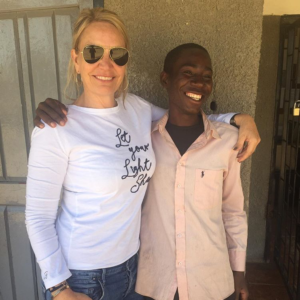Zamcog is a London-based charity founded by philanthropist, entrepreneur and investor Julie-Anne Uggla. It raised more than £5m, to help school thousands of disadvantaged, orphaned and highly vulnerable children in Zambia. And recently 12 orphans and vulnerable students have been given a chance to study a range of degree courses, from economics to heavy duty machinery, after the organization paid for both their secondary education and helped find them approximately £200,000 in scholarships.
Since it was started, Zamcog has turned a single classroom with only eight students into a fully functional boarding and day school for almost 450 pupils, which includes the Robert Shitima Primary School and the Markit Secondary School, funded by global financial information and services company, Markit. As well as funding the Shitima Markit School, Zamcog houses 96 orphans and serves more than 70,000 meals to children every term – some days, this is the only meal the 446 enrolled children eat as 99.5% of the children from the catchment area are below the poverty line.
We recently sat down with Uggla, a serial investor in technology businesses and impassioned changemaker to discuss this powerful initiative and what inspired her to dedicate very penny of profit back into the charities and causes she works with.
Tell us about your background and the lessons you learned that impacted your decisions today
I was born in Zimbabwe, but moved to Canada with my mother before my parents divorced. As an only child, growing up in a small apartment with a single parent, I learned early on the importance of having to work hard for what you want. I dropped out of school just before graduating in a bid to earn an income. And after a short-lived stint as a model at 19, I was encouraged to travel and hitchhiked throughout Europe.
When I returned to Toronto, I found work for a headhunting company. At 24 I then went on to set up and run a successful firm. Between 1992 and 1998, I had four children – which kept me and my ex-husband very busy! Around this time, I started to become actively involved in the non-profit industry and set up my first fundraiser in the Ukraine in 1992, which funded 16 different orphanages.
How did your desire and ability to “give back” grow?
It’s safe to say I had caught the charity bug and although the urge to run a business will never leave me – I more recently set up city guide technology business Cities Talking – I knew that I was in the position to be able to help children from disadvantaged backgrounds that otherwise made my poor upbringing look positively privileged!
In 2003, I set up Zamcog. So far, the charity has raised more than £5 million (over CDN 8 million), helping to school thousands of disadvantaged, orphaned and highly vulnerable children in Zambia (which neighbours my native Zimbabwe).
What are the biggest obstacles you face and what makes you proud?
The biggest obstacle I have faced as a charity founder and what turned out to be a huge learning point, has been in trying to take shortcuts because of a lack of funding.
Creating a half-way decent product or service is painful and knowing that you’ve created something that is not as good as it could have been. Now, whenever I do anything, I want to ensure that the necessary funding is there to take it across the line.
Zamcog is the organization that I’m most proud of. We’ve changed the lives of so many children through it, and in an empowering way, I’d argue. There are no handouts, our kids work incredibly hard, we’re just evening out the field by giving them the opportunity to an education [that] so many take for granted.
What are your plans for the future? Where do you intend to focus your efforts?
I think Zamcog will be, in the very near future, a much more independent entity, not needing as much foreign support as it does now. We are already creating that path, our people on the ground in Zambia are taking on a lot more of the day-to-day running of the entire project, local funding, local partnerships and community involvement. We have been highly instrumental and successful in working with our Zambian counterparts, allowing them to take on and create the projects that already exist and to start implanting new ones.
I’m not done with Zamcog and Cities Talking by a long stretch, but I do have something new in the pipeline – a film foundation. The idea is to grant free video production to charities that would otherwise be unable to afford access to a professional team capable of creating content that really shines a spotlight on what they do. I have high hopes to use the foundation as a vehicle and tool to create and expose change, highlighting issues in the world that would otherwise go unnoticed.
We live in times where a powerful message travels fast, and I want to do my bit to help that happen.
I’m sure I will continue as a private investor. In the last decade or so, I’ve invested in the likes of city discovery app Dojo, social network Wistla and Dagon (a Pizza Hut franchisee across Zambia, Mozambique and Zimbabwe, which has employed a number of students supported by Zamcog).
I’m also a benefactor to the Tate Modern, on the Chairman’s Circle committee for performing arts organization Roundhouse, a Human Rights Watch donor and UK ambassador for the International Center for Research on Women (ICRW) – so don’t think I’ll have a problem staying busy!

